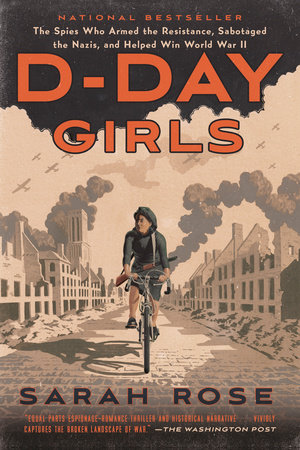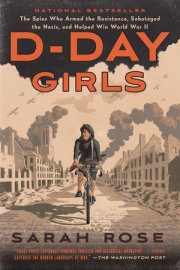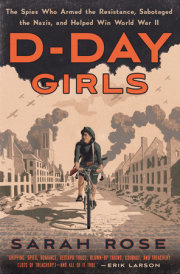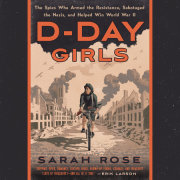God Help Us
London
Under the eternal gaze of Admiral Lord Nelson, high on a stone column in the center of London, Mrs. Odette Sansom raced toward her appointment at the War Office. The one-eyed, one-armed hero of Trafalgar got pelted in the rain, a bronze memorial to the glory that was Pax Britannica, many bloody conflicts removed from the London of July 10, 1942.
It was the 1,043rd day of the world’s worst war.
Much of the city lay in ruins, a ragged collection of gaps and edifices, like a child’s mouth after a lost tooth. Odette tilted her hat against the unremitting damp and sprinted past the admiral’s brass lions as if spirit alone could somehow put London to rights, so that it might smile again.
Upon meeting Odette, Londoners were confronted with her Gallic élan, her essential Frenchness. She was self-consciously prettier than her English peers: big chestnut eyes, a “fresh complexion” framed by dark hair that was pulled high off her heart-shaped face and hung loose down her neck. Her light coat was cinched with a belt, the only burst of color in an otherwise bland London rain-scape; the city was full of uniforms—soldiers, sailors, airmen. The entire world had gone drab. Although she had lived in England for much of her adult life, Odette never shed her Continental air, nor did she care to; frosty Britain seemed indifferent to sex and to women. With an inextinguishable flair for the theatrical, Odette preened and men in khaki swooned. It was said she even smiled in French.
The Victoria Hotel was a grande dame on mothballs, requisitioned for war work as the administrative home of the War Office. There were no bellhops to greet Odette; the twinkling chandeliers were packed off to safe storage; the building was dingy and practical like everything else. There were no dandies sharing cigarettes in the pink marble lobby; it was still busy, but with clerks and sergeants, men in mufti held back from the front, the old, the broken, those unsuited for battle, those too useful to be sacrificed. Someone had to run the war.
Odette arrived on account of a typed invitation—her second from the War Office:
Dear Madam,
Your name has been passed to me with the suggestion that you have qualifications and information which may be of value in a phase of the war effort.
If you are available for interview, I should be glad to see you at the above address at 1100 hrs on Friday 10th July.
Would you let me know whether you can come or not?
Yours truly, Selwyn Jepson
Captain
For an unhappily married woman in the third year of the war, the letter on government stationery was rife with potential. At a minimum, Odette’s appointment afforded a precious afternoon alone; there was a new film opening in Leicester Square, Mrs. Miniver, the story of how English housewives contribute to the war by coping, how matriarchs move mountains while men are at the front. There was window-shopping to do, though, as elsewhere in Europe, very little could be bought under rations on a husband’s service pay. At best, the letter might rearrange Odette’s life a little, for what “qualifications and information” could the army need but her native French-language skills? Perhaps the War Office sought translators. Or secretaries. She was not too old to type at speed, or she could write letters to prisoners of war in France. That would be a very worthy service.
Odette did not know what would be asked of her, and the captain’s note gave away little. If the War Office had something practical in mind, she was determined to be useful.
Odette lived in the soggy countryside of Somerset. Only thirty years old, she was a single parent to three daughters under six—Lily, Françoise, and Marianne—while her husband, Roy, was enlisted in the fight against Hitler. Roy was the son of the English soldier who billeted with her family during the Great War, and she had married him young— too young—at eighteen, practically an infant herself, she reckoned, so silly and adolescent; she panicked on her wedding night and refused to leave for her honeymoon. Instead, she dragged her mother and motherin-law to the cinema.
War had marked Odette’s entire young life. She was only four years old when her father was killed at the Battle of Verdun, just days before the armistice that ended World War I. He was one of 300,000 dead, a shameful, aching waste. The children of the interwar years came of age in a wounded Europe, still bleeding from the sores of Flanders and the Somme. France felt crippled by German brutality; Germany felt likewise about her neighbors’ punitive reparations. Fatherless Odette was raised in her grandparents’ house, her Sundays a litany of mandatory graveside visits and church offerings beside her widowed mother. As with so many daughters of the Great War, trauma altered Odette; it made her at once sweet and hard, vulnerable and ferocious.
As an adult, married but alone and mothering in England, the Blitz forced Odette to abandon the bustle of city life for the safety of green and empty farmlands. In 1940 and 1941, London’s nights were pierced by bombs and lit by searchlights; the sky was a daily fireworks show of flares and flames. Had she stayed, the baby would be fitted for a gas mask; she would have learned to distinguish between the sounds of a parachute mine and an anti-aircraft gun, even as she became bilingual in French and English. Somerset was better for the girls.
Odette’s days were now an endless series of country rituals: queuing at the baker, counting out ration coupons, mending clothes when fabric was impossible to get. Propaganda posters extolled the virtue of thrift: “I’m as patriotic as can be—and ration points don’t worry me!” The message was so bleak. “Go through your wardrobe. Make do and mend.” Odette had been fashionable once, a dressmaker who could pin-tuck and pleat some ooh-la-la into any ensemble, but there was no one left to look pretty for now that she was in rural exile. “Austerity clothes for the fourth year of the war,” exclaimed women’s weeklies; jackets without trimmings and “skirts without sin” were to be applauded. Odette longed for the thrill of London, the pleasure of companionship and attention. Rustic mothering and monasticism did not suit her. It was an unexceptional life for an energetic woman.
Captain Selwyn Jepson sat at his desk in the War Office, room 055a—previously known as Victoria Hotel, room 238—a former bedroom so small that it might have been a broom closet. Shorn of any glamour for the sake of utility, the room contained only one amenity: a sink basin. There was no furniture to speak of, save for an army-issue wood table and two plain chairs. The sparseness was deliberate, at the behest of the captain, who ordered the interview room emptied of everything that might hint of officialdom or even comfort. He was not there to chitchat or to shield himself from visitors behind a big desk. He wanted nothing to get in the way of absolute trust: no separation, status, or rank—unless, of course, he was interviewing a service member, at which point he donned his uniform out of respect.
Captain Jepson looked down his nose at the file sitting before him. Mrs. Sansom had no apparent enemy affiliation; His Majesty’s Government found nothing objectionable: “Nothing Recorded Against.” In other words, she possessed no criminal record. Scotland Yard and the MI5 security service had apparently decided she was an acceptable candidate for an interview. It was not piercing enough for his standards, to be sure. He would unearth objections, should they exist.
Full Christian Names: Odette Marie Celine
Nationality: British
Nationality at Birth: French
Upon her marriage, Odette became English by way of a legal concept known as coverture, meaning she was covered by her husband’s legal standing; she became part of him the way a hand is part of the body.
Odette’s file was opened on account of her keenness to help the war. In March 1942, an urgent call went out on the BBC evening news: The navy wanted photos of the French coast. On the 6:00 p.m. and 9:00 p.m. broadcasts, wedged between Proms concerts and news in Norwegian, the announcer explained that even the most boring souvenir photos would help the war effort. Trivial and mundane scrapbooks could turn the battle in Europe, and as went Europe, so followed the world. The announcement was one of many patriotic calls to service that year; the next morning Britons responded with some thirty thousand envelopes including ten million vacation snaps.
Odette also heeded the call. She donated her family photographs to the government, a collection of snapshots of herself as a young girl on the wide beaches near her native Amiens, of picnics and parasols, sand castles and beach shacks, of her brother, her mum, her grandparents, even a father she never got to know, the plain and ordinary reminders of summers long past.
The smallest details mattered in the world’s largest war. A top secret department at Oxford was at that moment pulling together a detailed map of the French shoreline. While England had ample information on France—Michelin maps, Baedekers narrating every harbor village, and nautical charts sounding every depth—the Admiralty required more specialized intelligence. To plan an invasion, the navy had to render a depiction of the country from wave height, from the prow of an incoming landing craft. The Inter Services Topographical Department (ISTD) was creating a comprehensive picture of the entire French coast and the Low Countries. The navy had to know what the harbors and beaches looked like, the gradient of each sloping dune, winding road, trickling river, any landscape feature that could yield insight into the water supply, blind spots, and approaches. No small-scale commando raid or aerial photographer could possibly produce such a map; the only way to get a broad picture was to cobble one together out of Britons’ prewar holidays. A cast of researchers at the Bodleian Library pored over the scrapbook bounty, taking photographs of photographs, then returned the albums to their rightful owners, who never knew what images had been preserved or even entirely why. The ISTD built a photo mosaic, a montage of family memories, and stitched the panorama together for a colossal topographical quilt. It was the platform for a battle plan of the Allied invasion of Europe. England was at war, and the last battlefield would be France.
Odette’s photographs were of no military value whatsoever. Her childhood snapshots never even found their way to the Naval War Library. Upon hearing the call on the BBC, Odette mailed her photos to the War Office, not the Admiralty; she was a non-native English speaker who misunderstood the difference. She posted her few family pictures to the wrong branch of service.
The machinery of military administration nevertheless churned. Postal clerks forwarded her note proffering assistance to a central registry, which funneled the information down appropriate, if opaque, channels to Captain Jepson.
When Odette entered the captain’s office, he rose like a man practiced in gentility. The windows were framed in heavy air raid curtains, making the close room feel even tighter; the raw light between them was harsh and electric.
Captain Jepson was an elfin man, in a dark suit, forty-two years old with a squeaky pubescent voice. In peacetime, he was a working journalist and middling mystery novelist; at war, he was a cynic who held tightly to the fixtures of his own gloomy mind. With coffee bean eyes and slick, dark hair, his suspicions gave him the air of a man who was eternally constipated.
The captain, in a clipped accent sharpened and honed at St. Paul’s School for heirs and aristocrats, started the interview with a rote question he put to anyone who entered his office: What did Odette think of the Germans?
She hated Hitler with a passion.
She detested what happened to France. Her mother was evacuated from her home; her brother was gravely wounded in the blitzkrieg and was recuperating in the Val-de-Grâce military hospital in occupied Paris, she said. Her country had been violated.
Oh, she figured she might find pity for the German people, but she had nothing but venom for the military occupiers.
The captain understood that French hereditary hostility to Germans was second only to Gallic enmity toward the English. At that moment in the war, it was his job, as his letter indicated, to select from the small but crucial subset of those he considered normal, common, and average British citizens, a few choice candidates who spoke flawless French, who could act French, and who were for all intents and purposes passably French.
“You would not know the way we do these things,” the captain began, with Odette’s file on the table before him. “We have made enquiries about you in this country and in France and we’re very satisfied by what we’ve found.”
Drama and overreaction were native to Odette, like a mother tongue. Her posture swung from demure and coquettish to highest dudgeon and outrage in less than a heartbeat.
“Well, what do you mean? Why did you have to make enquiries of me?”
In wartime England, Odette was suspect by virtue of her birth. There was resentment in Britain: The Frogs surrendered so quickly in 1940; the French army crumpled against the panzer advance; the Maginot Line was a punch line, a joke; Vichy ships in North Africa were at that moment facing off against the Allied fleet; French factories churned out weapons on behalf of a Nazi war that was killing Englishmen in Egypt.
Odette’s fidelities could become a critical component of the fight for Europe. The captain was recruiting secret soldiers for a clandestine war in Nazi territory, but women like Odette were English only by marriage; foreign-born brides of Britons were considered by many to be enemy aliens.
She rejected the insinuation with enough spite to retry the Battle of Hastings. In a fit, Odette recited her patriotic bona fides: She was a good mother to English daughters, a faithful bride to a British soldier defending king and country. She lived a quiet life, did nothing treasonous or illegal. Odette was as decent an Englishwoman as any bird born in Blighty.
“What do you think I am?”
In that moment, the captain made a decision: He was willing to risk Odette’s life.
Without specifying details of the job for which he was recruiting, or even the name of his employer, Captain Jepson offered Odette an opportunity to go to France for His Majesty’s Government, at three hundred pounds per annum. Would she volunteer?
“Wait a minute.” The captain paused. “What are your domestic circumstances?”
The minutiae of Odette’s life were detailed in the file before him, but he would not send a woman to war who pined for babies in England. Her chances of returning alive were no better than even—or less.
To the captain, she appeared unconcerned about her daughters; “Oh, they won’t bother,” he would recall as her response.
Odette was instead trapped in her thoughts. She framed the nebulous job offer in the language of a mother. Am I supposed to accept the sacrifice that other people are making without lifting a finger? she wondered. What would become of her girls if both France and then England surrendered to Hitler? She might not be useful to this tiny man, Jepson; she might not be good enough to serve. But she was determined to at least try on behalf of Lily, Françoise, and Marianne.
With only the vaguest idea of what the job entailed, Odette said, “Train me.”
The captain rose and escorted Odette the two short steps to the door, where they shook hands. She had a colossal personality and might not be willing to follow orders; she was too intense. Yet she met all qualifications: fluent French, British citizenship. The Allies had a need—a world-changing need—for women like Odette.
He returned to the file on his table and dashed off a quick note in the margins, his professional assessment of his newest hire:
God help the Germans if we can ever get her near them. But maybe God help us along the way.
Copyright © 2019 by Sarah Rose. All rights reserved. No part of this excerpt may be reproduced or reprinted without permission in writing from the publisher.







